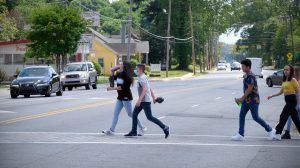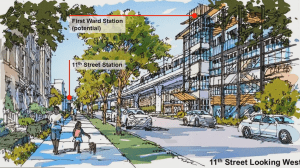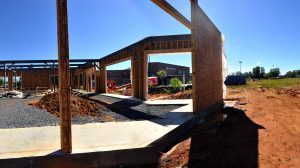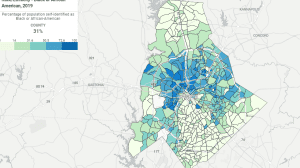Articles

As the goldenrod and blue mist flowers in my Charlotte garden began to fade in early October, so too did my hope for overcoming what appears to be a dismal year for butterflies across the Piedmont. My native plant garden is in an urban neighborhood. There probably isn’t enough intact habitat to attract or host […]

It’s been more than two years since Charlotte signed up for an ambitious goal: Eliminate deaths and serious injuries from vehicle wrecks by 2030. But this week, local officials told City Council members that the city is on pace in 2021 to equal or exceed the number of people killed last year. In 2020, 81 […]

Charlotte’s new east-west light rail is still decades away from completion, but a City Council committee on Monday got a closer look at some of the numbers dictating how, when and where the rail line is likely to be built. Running from Gaston County, past the airport, skirting uptown’s northern end and then running southeast […]

When it comes to Charlotte’s urban design, there’s a perception that the city is dominated by apartments and bland, corporate towers. But a new award series is trying to prove that’s not the whole story. The Charlotte Urban Design Awards (or Urbies) relaunched this year, co-hosted by the UNC Charlotte College of Arts + Architecture […]

When you think “Charlotte” and “urban design,” do you think “bland” or “exciting”? A new awards series, the Charlotte Urban Design Awards, is meant to prompt you to think more of the latter and less of the former. While Charlotte might get an unfair rap as a city of bland office towers and five-story, stick-built […]

Editor’s note: This story originally appeared in Transit Time, a weekly newsletter produced in partnership by the Urban Institute, The Charlotte Ledger and WFAE. On the surface, Charlotte — a fast-growing, finance-powered, landlocked metropolitan region — might appear to have little in common with Sodor, a fictional island off the coast of England with a […]

As fall arrives, migratory songbirds have begun journeying south for the winter. These birds traveled north in the spring to nest and raise their young, and now they are beginning to travel south to take advantage of the warmer weather and increased access to food. Some familiar migratory birds include hummingbirds, goldfinches, and many species […]

Editor’s note: Charlotte City Council voted unanimously to approve this rezoning petition on Nov. 15, clearing the way for this housing development. As Charlotte moves forward with its overhaul of development rules, a plan for new apartments and townhouses in a suburban, office-focused part of the city has exposed some of the tensions between building […]

Where you live in Charlotte and Mecklenburg County might reflect your race, income, education level, how old you are and even how likely you are to be in an area where eligible streams are adopted for clean-up. Newly updated maps from the Charlotte-Mecklenburg Quality of Life Explorer let you explore all these factors and more. […]

With the number of people experiencing homelessness in Charlotte and Mecklenburg County rising dramatically in the past year, local governments, nonprofit organizations and businesses are gearing up to implement a new plan over the next few years. A major goal of the 2025 Charlotte-Mecklenburg Housing & Homelessness Strategy will be to ensure homelessness is rare, […]

A flower bed might have a vibrant assortment of blossoms, but without the movement and sparkle of pollinators, it can seem flat and static. It’s been a bad year for butterflies in my garden, and I’ve heard similar reports from across the Piedmont. Their numbers seem to be down. Their absence has made me even […]

Leaders in the Charlotte region are finalizing the details of the first coordinated transit plan to go well beyond the city limits, a document they hope to adopt this fall. Connect Beyond, a 12-county initiative led by the Charlotte Area Transit System and the Centralina Regional Council, will release its full report on Monday. The […]